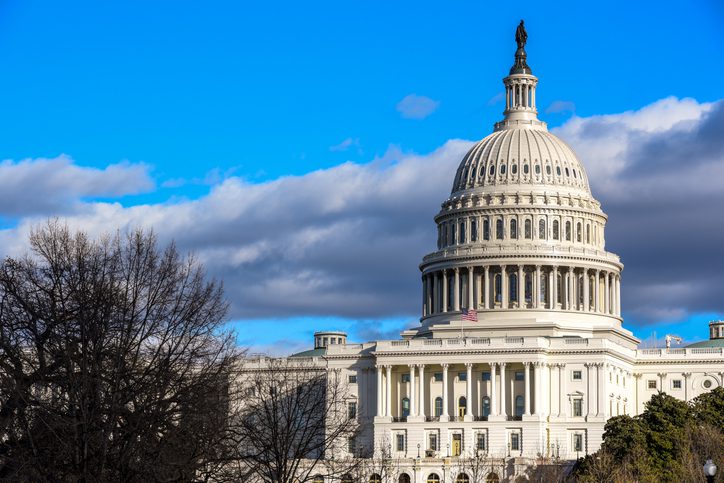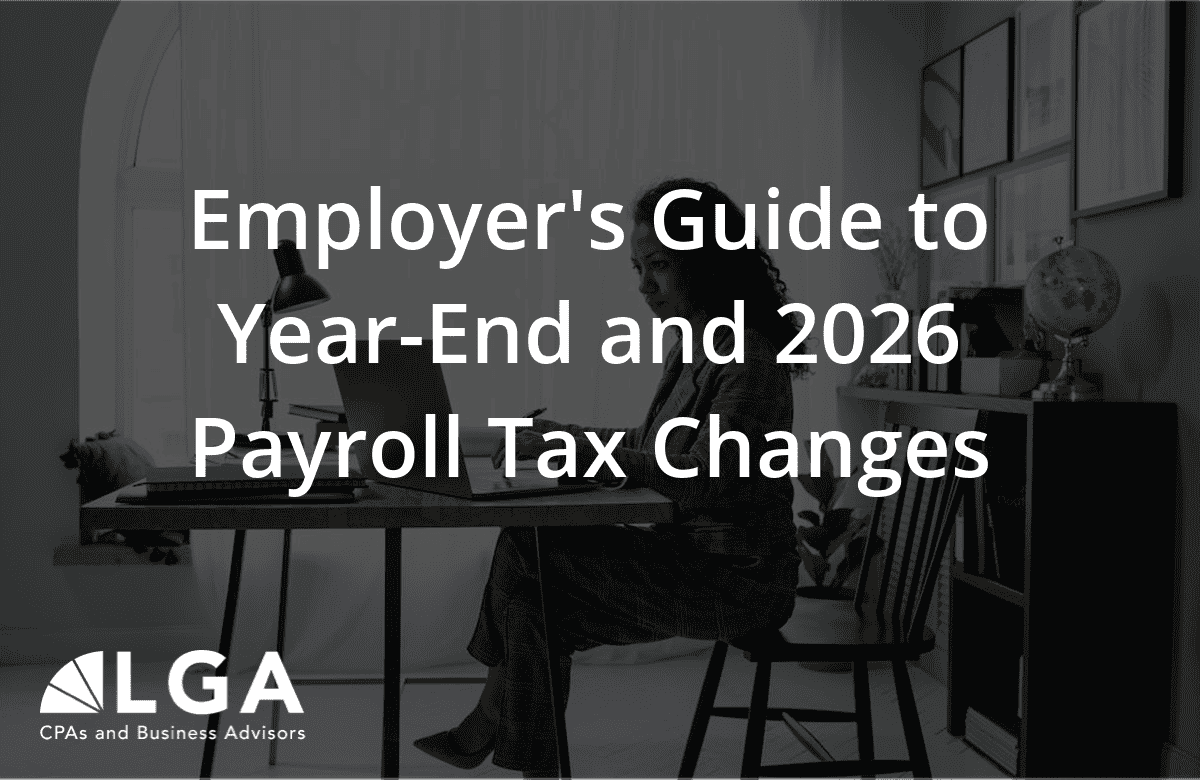
The Coronavirus Aid, Relief, and Economic Security Act (CARES Act) was enacted Friday, March 27, 2020. The Act makes $2.2 trillion in relief funding available to support the American people and our nation’s businesses during the COVID-19 crisis.
At LGA, we’re making it a priority to ensure our clients understand and benefit from the tax and financial implications of this legislation. We want to take a look at what the Act changes, how relief funds have been allotted, and how this legislation can best help you and your businesses.
How can this legislation help my business now?
Paycheck Protection Program: One of the most helpful benefits to small businesses available under the CARES Act legislation is the Paycheck Protection Program, a $349 billion lending capacity boost and expansion to SBA 7(a) loan program. These loans are will soon be available to certain small businesses, nonprofits, Tribal business concerns, and veteran’s organizations, and they are forgivable, either in part or in full, depending on conditions associated with approved use of the funds.
Economic Injury Disaster Loans: EIDLs are working capital loans now available to help small businesses, small agricultural cooperatives, small businesses engaged in aquaculture, and most private, non-profit organizations. These loans, provided through the Small Business Administration, are intended to help businesses meet their financial obligations through the disaster recovery period, January 31, 2020 to December 31, 2020. Some businesses may qualify for up to $10,000 in advanced funds when applying. Unlike loans through the PPP, EIDL loans are not forgiven, in part nor in full, but may have repayment terms up to 30 years, when needed.
Employee Retention Credit: Businesses now closed or with suspended operations due to COVID-19 that are still paying their workers will be eligible for a credit for employment taxes, the Employee Retention Credit. The credit is for 50% of qualified wages, limited to $10,000 per employee, and is allowed for the calendar quarter beginning after December 31, 2019. This credit applies if gross receipts during that quarter were less than 50% in comparison to the same quarter in 2019. The credit continues for subsequent quarters, allowing that your comparison with the same quarter in the prior year shows a reduction in gross receipts of more than 80%. But keep in mind that businesses already receiving aid through the Paycheck Protection Program are not eligible for this credit, and the credit will be reduced by any amount received under the Families First Coronavirus Relief Act as well.
Alternative Minimum Tax Credit: The 2017 Tax Cuts and Jobs Act (TCJA) repealed the credit for Alternative Minimum Tax (AMT) for tax years after December 31, 2017, with credits set to be received over a 4-year period, spanning 2018 to 2021. In an effort to get much-needed, additional cashflow to suffering businesses, the CARES Act will allow companies to immediately claim a refund for allowable AMT credit for tax years beginning after December 31, 2018, or by election for tax years after December 31, 2017, and accelerates the 4-year period to a 2-year period, now spanning 2018 and 2019.
Amend Net Operating Loss Returns: Corporate taxpayers now have the opportunity to amend returns in order to benefit from Net Operating Losses (NOLs). They can carryback a loss from 2018, 2019, or 2020 for 5 years, and the TCJA’s 80% limitation has been suspended for tax years beginning before January 1, 2021. Taxpayers have until March 15, 2021 (for calendar year filers) to amend and file refund claims for 2018 or 2019. Carrying back 2020 losses to earlier years won’t be possible until your 2020 return has been filed, so this provision may be one that helps more in long-term business planning.
Through modifications made to the TCJA’s limitation on losses for non-corporate taxpayers, pass-through entities may take advantage of unused excess business losses carried forward as NOLs, as the implementation of the TCJA limitation here has been pushed to 2021.
How could the CARES Act legislation help my business long-term?
Payroll Tax Deferral: Beginning on the day of the CARES Act enactment, March 27, 2020, through December 31, 2020, an additional provision applies that defers payment of the employer’s required 6.2% portion of Social Security tax on employees’ wages. Payments would be deferred, with no accrual of interest, as long as two timely installments are made over a two year period. The first payment of 50% will be due December 31, 2021, and the remainder will be due on December 31, 2022.
Business Interest Deduction: The TCJA previously set the business interest deduction at 30%, but the CARES Act increases this to 50% for 2019 and 2020. Additionally, the limitation of 10% of taxable income for charitable contributions is set to increase to 25%, and the charitable deduction for food contributions is expected to increase from 15% to 25%. An additional TCJA technical correction made in the CARES Act addresses issues surrounding Qualified Improvement Property (QIP). QIP is now, as well as retroactively to 2018, among other qualified property eligible for bonus depreciation, allowing for write-offs for property improvements and depreciation no longer requiring a full 39-year period. These TCJA changes can help businesses as they look to the future for ways to extend their economic recovery planning.
Tax Deadline Delayed: As we previously announced, the deadline for individual and corporate federal returns have automatically been extended to July 15, 2020 without penalty, and any 2019 federal taxes due will not incur penalties or interest during that time. There is also an extended period for payment of first quarter federal estimated taxes, allowing these payments to be made by July 15, 2020, also with no penalties and interest incurred. More than 30 states have followed suit thus far, modifying their filing and payment due dates by some degree. The Massachusetts Department of Revenue has extended the due date for filing and payment to July 15, 2020.
How does the CARES Act legislation help individuals?
Recovery Relief Payments: There are certain parts of this legislation that are “automatic,” meaning you will receive these benefits without taking any action. For example, recovery relief payments. Americans making up to $75,000 a year will receive a $1,200 payment, and a $2,400 payment will go to married couples making up to $150,000 a year, with households receiving an additional $500 per child under the age of 17. Although it will be a decreased amount, payments will still go to individuals making more than $75,000, but less than $99,000 a year, and couples making more than $150,000, but less than $198,000 a year.
How might the CARES Act legislation help individuals?
Unemployment Benefits: For some individuals, unemployment options may now be available to you. CARES Act funding has expanded unemployment insurance by $250 billion, and eligibility now includes individuals out of work due to coronavirus (or caring for someone with coronavirus), as well as self-employed and independent contract workers. Weekly payments for unemployment recipients will increase by $600 per week for a period of 4 months.
Retirement Account Withdrawals: Some of us may be looking for cash in unconventional places. It’s worth noting that the early 10% withdrawal penalty is waived for coronavirus-related withdrawals of up to $100,000 for a 180-day period from a qualified retirement account. The $100,000 is taxed over a 3-year period, and it may be paid back over that same time period.
Retirement Required Minimum Distribution: For retirees who don’t need funds, or for retirees preferring not to withdraw when the market is down, the Required Minimum Distribution (RMD) for IRA and 401(k) accounts has been suspended for 2020.
We’re here to help
In keeping with our mission to bring financial focus to your business, LGA is dedicated to helping our clients and community stay up-to-date on, and benefit fully from, any legislative developments and other financial implications of the COVID-19 pandemic. Don’t hesitate to contact us with your questions or for additional information.
by John Geraci, CPA, MST





